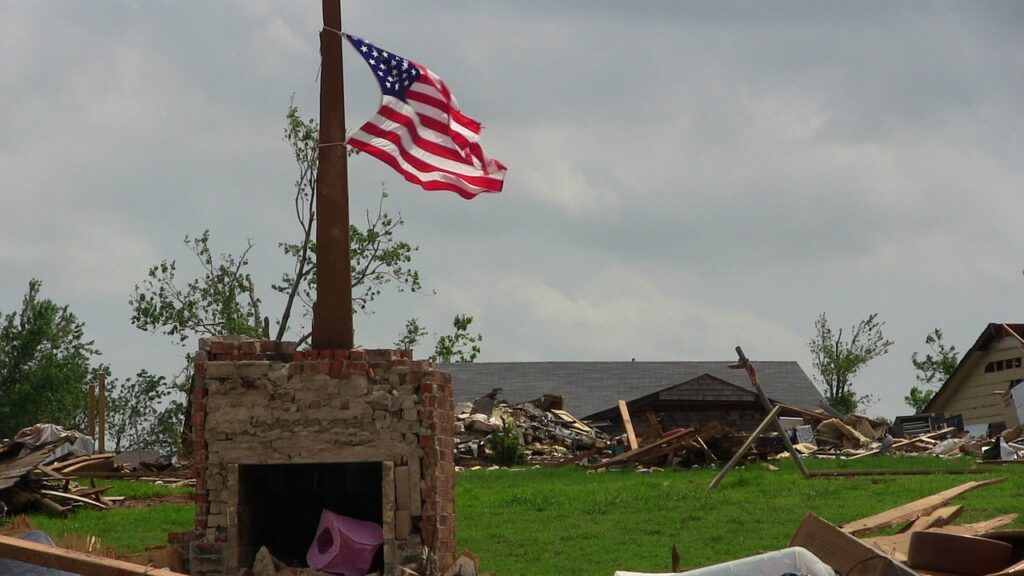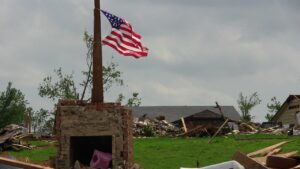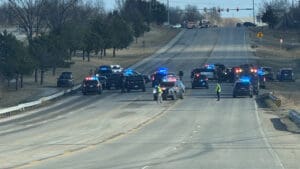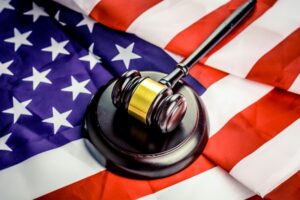Oklahoma’s unpredictable weather often results in catastrophic events such as tornadoes, ice storms, blizzards, hail, and high winds. Officials say last week’s 100 MPH winds caused more damage to the power grid than the 2007 ice storm. Besides damage to the electric and telecom infrastructure, there was an enormous amount of property damage in the area, including, but not limited to: damaged roofs, collapsed barns and outbuildings, dented automobiles, and damaged electric service weatherheads.
This sort of large-scale event brings with it what are called “storm chasers.” We are not talking about the highway-skilled storm trackers like Brandon Welles at KOTV. No, folks, we are referring to a nefarious group of itinerant opportunists who follow severe weather outbreaks and try to separate you from your hard-earned money.
Among the most common scams involve contractors who promise to help you with debris removal or repairs, or more insidiously, who pretend to represent FEMA or other governmental agencies. Then there are those who offer you a place to rent, with the caveat that you wire them the money first without inspecting the property.
Here are some tips from the Consumer Finance Protection Bureau:
Ask questions
“If the person trying to sell you a product or service can’t or won’t answer your questions, or if the paperwork doesn’t match the promises made to you, these are warning signs.
Example questions:
Can I see your identification and contractor’s license?
Can you provide three recent recommendations from the area?
How long have you been in business?
Confirm identities
Con artists may pose as government employees, insurance adjusters, law enforcement officials, bank employees, or whoever it takes to get to your money. Scammers can easily fake titles and uniforms.
Always ask for identification, and call the organization the person claims to work for to confirm if the person does work there.
Never give personal information to anyone you don’t know.
Remember that government employees will never ask you for financial information such as your bank account number.
How to avoid scams after a disaster
Don’t make a decision under pressure
After a disaster, contractors, as well as others, will arrive to help with home repair, debris removal, and other disaster-related assistance. Beware of contractors going door to door and people offering unsolicited “opportunities” or high-pressure tactics to force you to make a snap decision. Take your time and never sign anything without fully reading and understanding it first.
Don’t fall for people charging too much in times of crisis (price gouging)
This is when people offer “limited time only” deals or say the price of materials will rise if you don’t act now. These are also called “scarcity tactics.” Be suspicious of anyone offering to move you to the front of the line.
If you believe you have been a victim of price gouging, contact your state attorney general.
Stay up-to-date on possible scams happening in your area
After major disasters, the Federal Emergency Management Agency (FEMA) creates “Rumor Control” pages to dispel misinformation and help you protect yourself against scams. Find your local rumor control page on FEMA’s website by searching the name of the disaster you were in and ‘rumors.’ For an example, check out their Hurricane Maria and Hurricane Harvey pages. Your state attorney general may also have specific information about scams and what to do about them for your state.
Protect yourself against identity theft
After a disaster, you may be asked to give people sensitive information, like your Social Security number. Scammers can see this as an opportunity to steal your identity. Even if you’re careful to avoid scams, you may want to protect your identity, bank account, and credit record. A federal law now allows you to freeze and unfreeze your credit record for free at the three nationwide credit reporting companies-Equifax, TransUnion, and Experian, -no matter what state you live in. Freezing your credit restricts access to your credit file for potential new creditors. This makes it harder for identity thieves to open new accounts in your name.
You can also put a fraud alert on your credit record for one year. A fraud alert means lenders should call you to verify your identity before extending new credit, like opening up a new credit card, or giving out a loan.
If you’re unsure about any offer you receive, contractor you encounter, or action you’re asked to take, ask a trusted relative, friend, or an attorney for a second opinion before acting.
Watch out for these common disaster scams
Fake charities
After disasters, charitable giving spikes. Scammers may create fake charities to scam people who want to help. Sometimes these scams use names that are similar to organizations you may be familiar with to get you to make a “donation.” The Federal Trade Commission has more information about donating wisely and charity scams.
People pretending to be FEMA
All FEMA representatives, including home inspectors, have a laminated photo ID. Don’t trust someone with just a FEMA jacket or shirt and no ID. Call FEMA at (800) 621-3362 if you’re unsure if someone is truly a FEMA representative. No FEMA, federal, or state workers will ask for or accept money. FEMA doesn’t charge for home inspections, disaster assistance, or help filling out applications. If you have any doubt that a person is a legitimate FEMA worker, don’t give them any personal information.
Mortgage repayment/modification scams
After a disaster, scammers may offer homeowners assistance with negotiating or delaying their mortgage payments. Generally, lenders or mortgage servicers will work with you, the homeowner, after a natural disaster and offer forbearance or other hardship options to help you avoid going into default or ending up in foreclosure. Your options should ALWAYS be discussed directly with your mortgage servicer. Contact your mortgage servicer for payment assistance, and never pay anyone to negotiate with your servicer on your behalf. If you need help working with your servicer, you may want to contact a housing counselor or a lawyer for assistance.
Robocalls
You may receive a recorded call promising government grants, flood insurance, or help with applications for assistance. Don’t respond or provide personal information or payment to these callers. They may be scams trying to get your credit card or checking account information. Go to FEMA’s disaster assistance site for information on what help is really available.
How to/Where to report a scam
If you or someone you know has been a victim of a scam or fraud, here’s who you can contact:
Make a complaint to your local police or law enforcement agency and your state attorney general
Report the fraud or scam to the Federal Trade Commission
The National Center for Disaster Fraud will investigate and prosecute fraud, as well as advocate for disaster victims. You can call the Disaster Fraud Hotline at (866) 720-5721”
The bottom line is this:
Always ask for credentials, check references and online reviews, talk to someone who has used the contractor in question, go to the business’s website or Facebook page, check with the Better Business Bureau, and make sure the person or business is licensed, insured, and has the required local permits.
Never agree to anything on the phone, and never give out any personal information.
Finally, never pay someone upfront if you are not familiar with the company. Even then, there should be a written contract issued, which should be examined by your attorney.
Hopefully these tips will keep you from being scammed after a storm.
.








